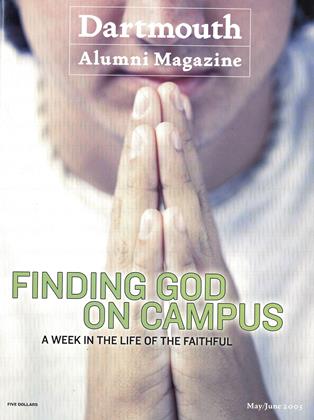QUOTE/UNQUOTE "Dartmouth is the only school where I really felt I saw everything. And, despite my best efforts, I didn't get a parking ticket there." -SEAN-MICHAEL GREEN, AUTHOR OF WHAT I LEARNED IN COLLEGE: A YEAR WITH THE TVY LEAGUE
TEN YEARS AGO THIS SPRING A Hungry woodchuck almost devoured Dartmouth's entire organic farm before it produced a harvest, gobbling up the lettuce and cucumber seeds before they had even sprouted.
This season the 2-acre plot located at a crook in the Connecticut River just a few miles north of campus—originally Fullington Farm—expects a harvest of rutabagas and Brussels sprouts, kohl rabi and blue potatoes, peanuts and cotton and, of course, lettuce and cucumbers, which will wind up in Collis' salad bar.
As the crops have flourished, so has student interest. In addition to the 50 students who will volunteer at the farm this year, undergrads will visit the site to study environmental studies, geography or painting.
Some may also take away lessons about organic agriculture. The property— a former dairy farm purchased by the College in the 1970s—now adheres to strict government-set rules about pesticides, water purity and fertilizer nitrogen levels, so as not to repeat the land-stripping the Upper Valley suffered in the 19th century.
In focusing on sustainable growing, Dartmouth has placed itself at the fore front of a national movement. From California to Vermont to Maine to Rhode Island, colleges are planting similar small organic farms, even in urban jungles. The idea is to give agriculture, typically part of a technical curriculum, a liberal arts slant.
of farmers, gardeners, landscapes and educators to which Dartmouth belongs. "It has to be one of the more exciting campus trends out there," says Bill Duesing, co-founder of the Connecticut chapter of the Northeast Organic Farming Association, a 4,000-member group
Now schools such as Middlebury, Brown, Vassar and even Yale, which planted a 1-acre farm on its downtown campus, are taking a hands-on approach to the study of where food comes from, though they are heavily dependent on volunteers and creative budgeting.
Dartmouth's farm is still far from profitable, according to manager Scott Stokoe, and must make do with a shoestring $20,000-an-acre budget and a large amount of donated equipment, much of it lugged there in Stokoes own truck. Sales of its produce cover just 10 percent of the budget. "We're begging and borrowing and stealing to get by," Stokoe says. "But it's great to be able to get an Ivy League education playing in the dirt."
There are also distinct social reasons for chipping in at the farm: 200 acres of land in total, much of it forested and some crisscrossed with hiking trails, and a house with three student rooms—an unconventional dorm that doubles as a forum for occasional bluegrass hootenannies. "My best friends are all people I met through the farm, but it introduces you to a larger Upper Valley community," says Jess Saturley '07, a likely English major who lived and worked there last summer. 'All the volunteers have a sense of responsibility to a higher purpose."
Outdoor Ed Dartmouth's organic farmgives liberal arts majors a chance to gettheir hands dirty—and grow themselves.
 View Full Issue
View Full Issue
More From This Issue
-
 Cover Story
Cover StoryFinding God at Dartmouth
May | June 2005 By CATHERINE FAUROT, MALS ’04 -
 Feature
FeatureA Life Overboard
May | June 2005 By BRYANT URSTADT ’91 -
 Feature
FeatureLost and Found
May | June 2005 By Jennifer Wulff ’96 -
 Feature
FeatureNotebook
May | June 2005 By THOMAS AMES JR. '74 -
 Feature
FeatureAlumni News
May | June 2005 By Olivia Britt '00 -
 FACULTY OPINION
FACULTY OPINIONShiny Bubble
May | June 2005 By JOHN H. VOGEL JR.
C.J. Hughes ’92
-
 Article
ArticleHALLS OF NAME
May/June 2007 By C.J. Hughes ’92 -
 Feature
FeatureZoology
MAY | JUNE 2014 By C.J. Hughes ’92 -
 COVER STORY
COVER STORYWhy Is Dartmouth So Expensive?
MAY | JUNE By C.J. Hughes ’92 -
 Feature
FeatureWhat a Racket!
NOVEMBER | DECEMBER 2015 By C.J. Hughes ’92 -
 FEATURE
FEATURE“The Idiocy of War”
JULY | AUGUST 2017 By C.J. Hughes ’92 -
 HISTORY
HISTORYLegal Hurdles
JULY | AUGUST 2025 By C.J. Hughes ’92







